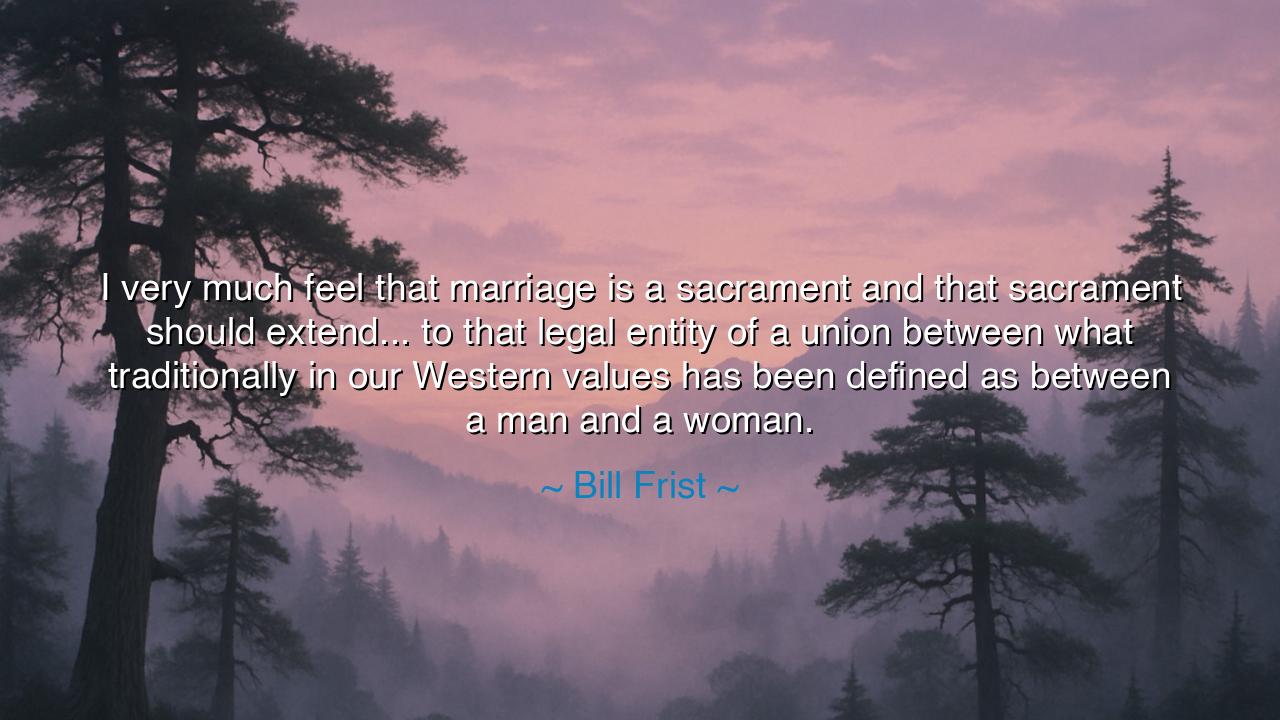
I very much feel that marriage is a sacrament and that sacrament
I very much feel that marriage is a sacrament and that sacrament should extend... to that legal entity of a union between what traditionally in our Western values has been defined as between a man and a woman.






“I very much feel that marriage is a sacrament and that sacrament should extend… to that legal entity of a union between what traditionally in our Western values has been defined as between a man and a woman.” Thus spoke Bill Frist, and in his words we hear both reverence and boundary. He lifts marriage into the realm of the sacred, seeing it not as a mere contract, but as a holy bond, sanctified by spirit as well as law. To call it a sacrament is to declare it more than earthly—it becomes a vessel of divine presence, a bridge between flesh and eternity. Yet within this exaltation, Frist roots the bond in a particular tradition, one shaped by the customs of the West.
From the ancients to the moderns, marriage has always been more than the joining of two lives. It has been the hearth of the community, the foundation upon which nations rest. In the eyes of the medieval Church, to enter into marriage was to step into one of the seven sacraments, a holy mystery wherein the love of man and woman mirrored the union of Christ and His Church. For Frist, this heritage is a river flowing through history, carrying with it the weight of centuries. To step into marriage is not merely to embrace another, but to join a chain stretching back to ancestors who also vowed fidelity at the altar of faith.
Yet we must also see the limits of his words. When he speaks of “Western values,” he frames the sacred bond within a cultural tradition, one that defines marriage in a specific form: man and woman. This was the inheritance of Rome, of Christendom, of Enlightenment societies. And indeed, in these lands, marriage was revered as the crucible where family is formed, children nurtured, and the future of society assured. To him, the sanctity of this form is not to be diluted, lest the ancient structure crumble.
Consider the example of the Roman matrons, whose fidelity was seen as a reflection of Rome’s strength. Marriage was the citadel of civic virtue, binding households in order and devotion. Likewise, in medieval Europe, kings and peasants alike were bound by the same rite, the same vows, the same sacred recognition that love was more than desire—it was duty, sacrifice, and covenant. Frist’s words echo this historical lineage, affirming that marriage is a cornerstone of civilization, worthy of reverence and preservation.
But history is also filled with transformation. In other lands, in other times, marriage took many forms, and even within the West, its meanings shifted as societies grew. Once it was arranged for property, then embraced for love. Once women entered it as subordinates, now as equals. The very idea of marriage as a sacrament endures, but how it is understood has evolved. Thus, Frist’s declaration is also a reminder: each generation must wrestle with how to honor the sacred while also answering the cries of the present.
The lesson for us, then, is twofold. First, do not treat marriage as a trivial contract, for in it lies the potential for transcendence. To bind one’s life to another is no small thing; it is to step into fire and emerge as something greater. Cherish it with reverence, with patience, and with courage. Second, understand that while traditions guide us, the heart of the sacrament lies not merely in form, but in the depth of love, fidelity, and sacrifice that it demands. The outward shape may shift, but the inner flame must remain holy.
Practical wisdom follows: treat your union, whether past, present, or future, as sacred. Speak vows not lightly but as though the heavens themselves were listening. Build your household not only on affection but on steadfast devotion. And when you consider the customs of your time, weigh them against the eternal values of compassion, dignity, and truth. For marriage—however it is defined in any age—will always be a mirror of the society that honors it. In how we live our unions, we declare to the world what we believe about love, duty, and the very meaning of being human.






AAdministratorAdministrator
Welcome, honored guests. Please leave a comment, we will respond soon